|
|
|
Sort Order |
|
|
|
Items / Page
|
|
|
|
|
|
|
| Srl | Item |
| 1 |
ID:
130996
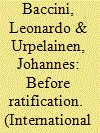

|
|
|
|
|
| Publication |
2014.
|
| Summary/Abstract |
When do international treaties cause domestic policy adjustments? While previous research emphasizes the consequences of treaty ratification, we argue that the need to secure entry into force can induce states to change their policies already before ratification. If a state expects benefits from a treaty, it can increase the probability of foreign ratification by implementing policies that benefit pivotal domestic players within its partner country. Accordingly, studies that focus on policy change after ratification underestimate the importance of treaties and partly misconstrue the causal connection between treaties and policies. We test the theory against data on the relationship between North-South preferential trading agreements (PTAs) and automobile emission standards, finding that developing countries adopt automobile emission standards between the signature and ratification of North-South PTAs.
|
|
|
|
|
|
|
|
|
|
|
|
|
|
|
|
| 2 |
ID:
135575
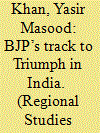

|
|
|
|
|
| Summary/Abstract |
The political landscape of India witnessed a historical about-turn when the Bharatiya Janta Party (BJP) decisively ended the decade-long political monopoly of the Indian National Congress (INC). it goes without saying that the unprecedented victory of the BJP in the recent elections has out-distanced even its own major success of 1998. No doubt, there are a number of crucial factors which paved the way for its resounding success. one of course, is the political and ideological vacuum created by the rival INC. this said, however, this paper seeks to uncover other distinct and multifaceted factors which led to the overwhelming rise of the tide of Hindutva, and this despite the fact that India is touted as being a secular and pluralistic democratic state.
|
|
|
|
|
|
|
|
|
|
|
|
|
|
|
|
| 3 |
ID:
128146
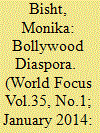

|
|
|
|
|
| Publication |
2014.
|
| Summary/Abstract |
The liberalization and the forces of globalization enhance the employment options, expansion of service sector and demand of skills across the borders. With this liberalization of the economy, a growing number of NRIs primarily from the United States and United Kingdom have also begun investing in their cultural homeland (Pulkit Datta: 2008). The aspiration of better lives and employment opportunities expanded the size of middle class abroad during 1990s, the terms "Non Resident Indian" emerged for the Indian who is living abroad. This is why; this period can be considered as the Golden Age of the NRI, which resulted the emerging middle class and the new material aspirations of an India in the midst of economic liberalization (Ingrid Thewath:2010).
|
|
|
|
|
|
|
|
|
|
|
|
|
|
|
|
| 4 |
ID:
137306
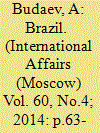

|
|
|
|
|
| Summary/Abstract |
RECENTLY, soft power as an important factor of international relations and interstate communication has come to the fore in international and Russian political discourse. At the turn of the 1990s, well-known American political scientist and neoliberal Joseph Nye, Jr. offered his now famous and widely used formula: "What is soft power? It is the ability to get what you want through attraction rather than coercion or payments"1 and specified: "The ability to affect what other countries want tends to be associated with intangible power resources such as culture, ideology and institutions."2 Later, the formula was extended to include attractive domestic policies, economic achievements and even the (American) life style and (American) values.
|
|
|
|
|
|
|
|
|
|
|
|
|
|
|
|
| 5 |
ID:
141846
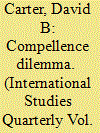

|
|
|
|
|
| Summary/Abstract |
This article introduces the idea of a compellence dilemma. This dilemma arises when the domestic policies of adversaries—such as hosting violent groups—threaten states’ security. Such states often consider coercive instruments to compel their adversary to change those policies. The problem? The prospect of costly punishment makes cooperation more attractive for the adversary. However, if they fail to coerce policy change, harsh punishments can reduce the adversary's capacity to enact policy change and induce harmful domestic instability. These problems are compounded by the fact that both the threatened states’ incentive to use costly punishments and the costs of failed compellence increase with the severity of the security threat. The logic of the compellence dilemma applies whenever a state uses damaging coercive instruments but risks failing to achieve its immediate objectives. I analyze the compellence dilemma with a dynamic game-theoretic model of interaction among a target state, host state, and violent group, and show that it is pervasive in equilibrium. I show that the compellence dilemma causes states to refrain from using harsh punishments even when they would compel the host state to cooperate. Concerns about decreasing future host-state capacity and increasing group power drive this result.
|
|
|
|
|
|
|
|
|
|
|
|
|
|
|
|
| 6 |
ID:
112806


|
|
|
|
|
| Publication |
2012.
|
| Summary/Abstract |
Standard works on international environmental governance assume single-issue regimes with binding obligations designed to govern the behaviour of states. Yet many of the most pressing global environmental problems, including climate change, forest degradation and biodiversity loss, are governed by an array of mechanisms-legal, non-legal, governmental and non-governmental-in complex arrangements. Examining the combined effects of these international and transnational efforts on domestic or firm policies and practices-the usual targets of such efforts-requires expanding a focus on regime 'compliance' and 'effectiveness' to 'influence' factors from beyond state borders. To facilitate such a move, the authors develop a framework that distinguishes four distinct pathways through which actors and institutions influence domestic policies: international rules; international norms and discourse; creation of, or interventions in, markets; and direct access to domestic policy processes. Propositions are then developed on the conditions under which, and processes through which, actors and institutions affect domestic and firm policies and practices along each pathway. The framework is applied to the case of forest governance, a prototypical example of complex global environmental governance.
|
|
|
|
|
|
|
|
|
|
|
|
|
|
|
|
| 7 |
ID:
130893
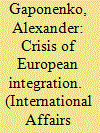

|
|
|
|
|
| Publication |
2014.
|
| Summary/Abstract |
AFTER THE USSR'S COLLAPSE, the Baltic states came under the political influence of the US and the economic influence of the European Union. This influence was used by their new geopolitical "curators" to initiate an anti-Russian line in both the foreign and domestic policies of Latvia, Lithuania and Estonia, as well as to break their economic ties with Russia. At present, the only significant economic ties that Russia still has with the Baltic countries are in the energy sector. It's the supply of natural gas through the pipeline and distribution systems with the use of the Incukalns underground storage facility. It's also the supply of Russian electricity and rail deliveries of hydrocarbons via the Ventspils and Klaipeda ports.
|
|
|
|
|
|
|
|
|
|
|
|
|
|
|
|
| 8 |
ID:
138393
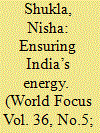

|
|
|
|
|
| Summary/Abstract |
Recent policies on energy which has been adopted by previous and recent governments of India provided new hope. With all these new energy ties, India can aggressively court the Middle Eastern and African countries, as they look for newer customers. Sustainable economic development is a vision and a way of thinking and acting so that we can secure the resources and environment for our future generation.
|
|
|
|
|
|
|
|
|
|
|
|
|
|
|
|
| 9 |
ID:
130997


|
|
|
|
|
| Publication |
2014.
|
| Summary/Abstract |
Decisions in international institutions such as the European Union (EU) are often made by consensus, even when it is not required. Tit-for-tat exchanges provide an explanation for this phenomenon, as such exchanges can help to build up support for agreements states might otherwise not have had an incentive to support. Tit-for-tat exchanges are typically analyzed as trades of support across agreements. However, we argue that the priority of negotiators to further their national and bureaucratic interests makes exchanges across micro-level issues within a single proposal for agreement more prevalent than exchanges across agreements. Using both qualitative and quantitative analyses, we show that such within-agreement, rather than cross-agreement, linkages are related to an increased likelihood of consensus across an array of different EU agreements. To understand consensus in international institutions, more broadly, it is therefore necessary to look at the substantive issues at stake within each agreement
|
|
|
|
|
|
|
|
|
|
|
|
|
|
|
|
| 10 |
ID:
092343
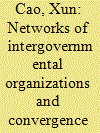

|
|
|
|
|
| Publication |
2009.
|
| Summary/Abstract |
We studied three potential causal mechanisms through which network dynamics of intergovernmental organizations (IGO) might cause convergence in domestic economic policies. First, IGO networks facilitate policy learning by providing relevant information. Second, they encourage policy emulation by creating a sense of affinity among countries that are closely connected by IGO networks. Finally, some powerful IGOs ''coerce'' their member states to adopt certain policies. We used causal modeling to test the relationships between different types of IGOs (and the causal mechanisms to which they mostly correspond) and policy convergence. The findings demonstrate the important roles played by salient IGOs such as the WTO, the EU, and the OECD, with each of them having a strong converging effect on their member states' domestic economic policies. More interestingly, we find that the cumulative effects of multiple layers of even the weakest types of IGOs have strong causal effects on states' domestic policies. Indeed, the shared memberships in IGOs with economic functions and with the minimal level of institutional capacity are not only statistically associated with, but also have converging causal effects on, countries' domestic policies. This supports the information-driven policy learning mechanism. The emulation mechanism in which IGO networks create a sense of affinity and therefore facilitate policy diffusion and convergence, on the other hand, is not supported by empirical analysis.
|
|
|
|
|
|
|
|
|
|
|
|
|
|
|
|
| 11 |
ID:
101898


|
|
|
|
|
| Publication |
2011.
|
| Summary/Abstract |
The American version of capitalism is no longer dominant around the world.In the next decade, developing countries are likely to continue to trade the flexibility and efficiency associated with the free-market model for domestic policies meant to ensure greater resilience in the face of competitive pressures and gobal economic trauma.
|
|
|
|
|
|
|
|
|
|
|
|
|
|
|
|
| 12 |
ID:
128145
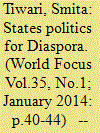

|
|
|
|
|
| Publication |
2014.
|
| Summary/Abstract |
Migration is a natural continuous and spatial phenomenon. People move from one place to another and create Diaspora in the form of transnational network. As Sheffer says, modern Diasporas are "ethnic minority groups of migrant origins residing and acting in host countries but maintaining strong sentimental and materials links with their countries of origin their homelands". (Sheffer, 1986:3). Modern Diasporic communities which live outside but maintain link with their country of origin are getting larger and stronger, and influencing both domestic politics and foreign relations of a states.
|
|
|
|
|
|
|
|
|
|
|
|
|
|
|
|
|
|
|
|
|